Introduction
This paper investigates the influence of the global financial crisis (GFC) on world economies, scrutinizing the key financial indicators to do so. In addition, a case of a company is studied to evaluate the impact of GFC on a particular firm, and consider the capability of the firm to survive the crisis.
The Impact of the Global Financial Crisis on the Economy
Explanation and Definition of Financial Crisis
The Global Financial Crisis (GFC) took place during the late 2000s, namely, in 2007-2009, and affected a large number of countries all over the world. GFC was the worst financial crisis since the 1930s, that is, after the infamous Great Depression (Savona, Kirton, and Oldani 4). Furthermore, GFC triggered what is known today as the Great Recession of the late 2000s – early 2010s, a general economic decline which is stated to have been the worst global recession since the times of the Second World War (Savona, Kirton, and Oldani 3).
GFC began with the collapse of the housing and stock markets in the United States of America; such a number of subprime mortgages was taken that approximately 9 million owners of houses or apartments in the USA owed their banks more money that the total cost of all their property (Karanikolos et al. 1323). An increasing number of individuals failed to fulfill their financial obligations towards their banks or other mortgage providers; furthermore, the price of real estate went down, and fewer people started taking house loans; on the whole, “the value of mortgage-backed securities plummeted” (Karanikolos et al. 1323). The economic bubble burst, and the crisis affected the mortgage and housing markets.
Channels through Which the Financial Crisis Was Transmitted Inside an Economy
The financial crisis, apart from having spread to a large number of countries worldwide, also influenced the internal market of the U.S., affecting numerous sectors of the American economy. The mechanism in which it spread consisted of a series of elements. For instance, the fact that debtors defaulted on their obligations meant that other bank customers lost their trust in their banks, causing bank runs – situations in which too many depositors attempt to take back their deposits simultaneously, depleting the financial resources of banks (Shin 103); clearly, the number of new deposits also dropped. Such a situation may often result in the bankruptcy of banks and financial institutions.
In turn, to prevent the bankruptcy or financial contagion, the state provided financial support for the banks (a bailout), drawing on the resources of the national government (The Economist n.pag.). The rough situation in the banks prevented the latter from giving loans to clients, transmitting the crisis to other sectors of the economy – those in which the customers would not need to use the money they borrowed from banks to purchase.
Overall Effect of GFC on Different Sectors of Economy
The fact that the capability of the banks to give loans to their customer drops dramatically means that customers suffer from reduced capability to buy goods and services. The resulting drop in purchases hits many other sectors of the market; companies that are unable to sell their products are forced to decrease the amount of produced goods; this increases the rates of unemployment (Karanikolos et al. 1323-1324), and the dearth of jobs further reduces the ability of the population to buy goods and services – this time, not only in those sectors in which bank loans are usually used, but also in those in which clients use non-borrowed money. (Of course, the lack of sales and drops in production forces firms to buy less as well.)
Therefore, the financial crisis affects multiple sectors of the economy inside a single country by reducing the purchasing capabilities of the population (products and services market), decreasing sales and profits of companies, and increasing the rates of unemployment (labor market), further lowering the population’s and companies’ ability to buy.
Channels through Which GFC Was Transmitted Globally
The main channel through which the financial crisis was spread globally was also the housing and mortgage sectors of the market. In fact, it is stated that “many mortgage-backed securities were sold in Europe” (Karanikolos et al. 1323), which caused the financial crisis to spread to Europe as well. It is noted that numerous banks from Europe also invested large amounts of finances in sub-prime house loans in the United States, which meant that the crisis in the U.S. also had a significant effect on these banks (Business Think n.pag.).
The spread of GFC to Asia occurred rapidly, via trade channels. The exports from Asian countries contracted quickly, which led to the inability of companies to sell their products, resulting in unemployment, and, consequently, in the inability of the population to purchase. However, Asia suffered relatively little from financial problems (Heng 269).
Different Sectors’ Integration across Countries, and Key Financial Indicators of the Crisis
All the sectors of economies were integrated into the problems caused by GFC. The crisis reduced the capability of banks to give loans, significantly decreasing the ability of customers (both private persons and companies) to purchase goods and services. This resulted in a major decrease in production virtually in all the sectors of the economies. For instance, GDP in the U.S. and the E.U. (28 countries) also dropped during GFC, which can be seen from the chart below; the chart demonstrates the percentage of change in quarterly GDP compared to GDP of the same quarter in the previous year (OECD, “Quarterly GDP” n.pag.):
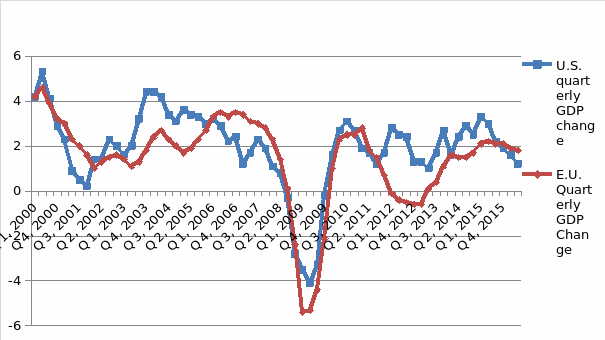
It can be seen that the first drop in the U.S. GDP compared to the GDP of the same period in the previous year occurred in the third quarter of 2008; the line goes below the zero. This followed some of the first bank bankruptcies of 2008. It is also seen that GDP fell even further during the following periods; it only began growing again in the first quarter of 2010 in the U.S. The data from the E.U. is similar during GFC.
Other macroeconomic indicators show similar patterns prior to, during, and after GFC. For instance, the imports (in million U.S. dollars) were as follows (OECD, “Trade in Goods and Services” n.pag.):
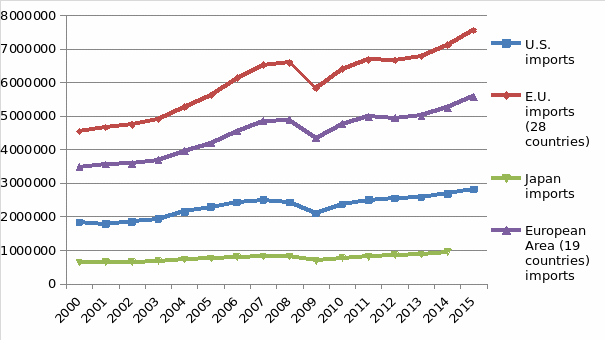
The exports (in million U.S. dollars) were (OECD, “Trade in Goods and Services” n.pag.):
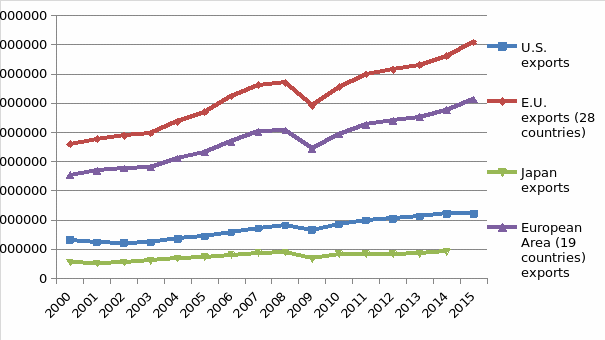
Thus, all the countries taken as examples experienced decreases in both exports and imports; one of the main reasons for this is that the decreased capability of consumers to buy goods led to drops in imports at home, and, respectively to drops in exports in exporting countries, in which a similar situation led to drops in imports, etc.
The inflation rates as measured by consumer price index were as follows (OECD, “Inflation (CPI)” n. pag.):
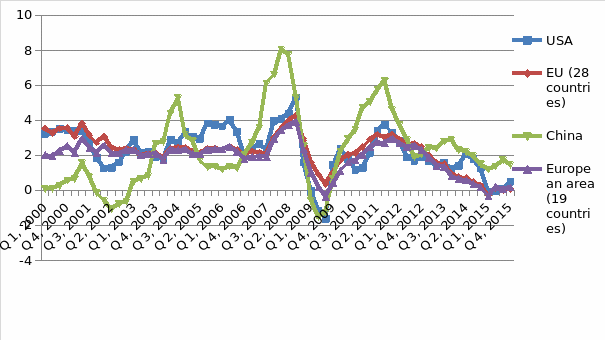
All the currencies given as examples experienced high inflation rates during approximately 2007-2008. It might be possible to state that this resulted from the attempts of the governments to bailout banks. The inflation rates started going down at the end of 2008 – beginning of 2009.
The total exchange rates (national currency / U.S. dollar) were as follows for GBP and EUR (quarterly data not available) (OECD, “Exchange Rates” n. pag.):
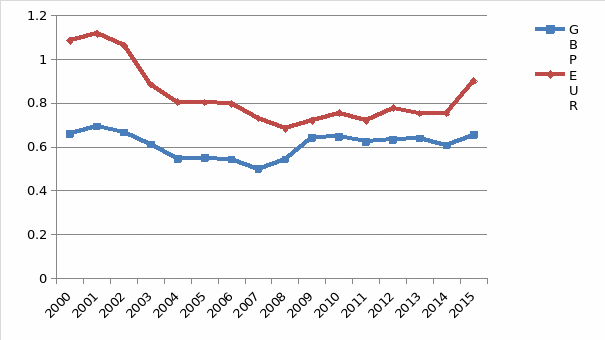
The exchange rates did not change considerably, probably because the crisis was in effect in all the countries using the currencies the exchange rates for which are shown.
Finally, long-term total interest rates per year were as follows (OECD, “Long-Term Interest Rates” n.pag.):
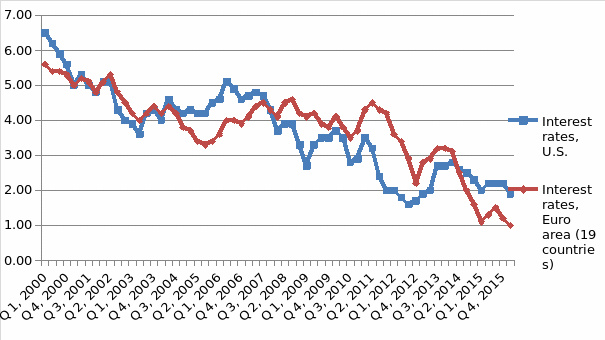
Thus, prior to the crisis, the interest rates in the U.S. were going down most of the time, apart from a few rises; they were always lower than at the beginning of 2000. The lower interest rates stimulated taking house loans, leading to the formation of the financial bubble. Also, during a recession, buyers will attempt to preserve money and not borrow or invest it, which is why interest rates did not grow considerably during the crisis.
The Global Financial Crisis and the Starbucks Company
The Impact of GFC on Starbucks
Starbucks Corporation is an American company owning a chain of coffee shops and operating at home and worldwide. As other companies, it was also affected by GFC.
It is stated that this company’s products are of high quality, but their cost is higher than of those offered by other coffee companies (Husain, Khan, and Mirza n.pag.). Therefore, clients, who suffered from the crisis, opted for other shops where coffee was cheaper. In 2008, Starbucks had to close approximately 600 shops; in 2009, another 300 shops were closed, and 6,700 workers were subjected to compulsory redundancy (Husain, Khan, and Mirza n.pag.). The incomes of the company plummeted down dramatically; the graph below shows the net incomes of Starbucks for trailing twelve months from the end of the indicated month over the period 2004-2016 (“Starbucks Net Income (TTM)” n.pag.):
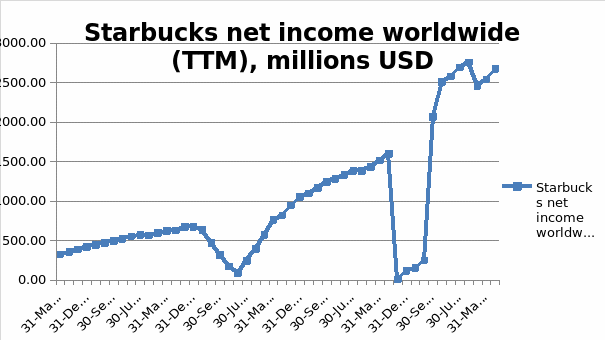
It is also possible to assess the company’s return on investment (ROA) during the crisis. As it can be seen, it also indicates that the company suffered a major decrease in its profits (“Starbucks Return on Assets (TTM)” n.pag.):
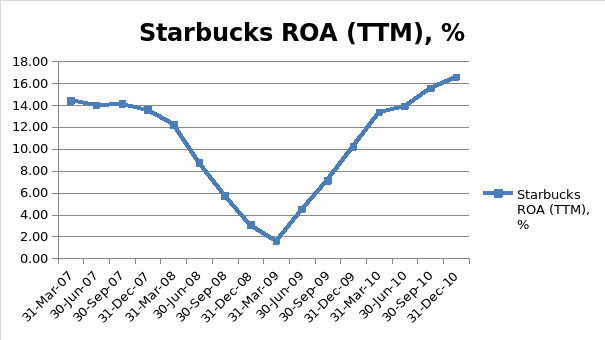
Key Indicators Explaining the Effect of GFC on Starbucks in the U.S. and Worldwide
The effect of GFC on the profits of Starbucks in the U.S. can be explained by using GDP. The rate of GDP growth in the U.S. started going down in the first quarter of 2008, and became negative in the third quarter of 2008 (in comparison to the respective period of the previous year; see the graph above). It is easy to see that the net income of Starbucks also began declining in 2008; the graph provided above depicts the net income worldwide, including the net income gained in the U.S., which is the larger part of the total net income of the company. It was explained above that the clients of the company had to purchase their coffee in cheaper shops.
The inflation rate in the U.S. can also explain the decrease in Starbucks’ profits; the expenses of the business grew, but it was unable to considerably increase the price of its products (coffee) due to the lack of buyers.
However, the decrease in the net income in foreign countries can be associated with such an indicator as international trade flow. Due to low international trade flow, incomes of a business may go down especially in the situation when it relies on export or imported goods, whereas Starbucks had to import coffee to most countries in which it was operating.
Critical Evaluation of the Steps Taken by Starbucks to Avoid or Address the Effects of GFC
Starbucks took a number of steps to overcome GFC. For instance, the enterprise made a significant effort aimed at improving the operational aspect of the business; also, the structure of the organization was improved, leading to a decrease of $580,000,000 in the cost of the company (Starbucks Corporation 3). However, the main changes were related to enhancing the client’s experience in company’s shops (Starbucks Corporation 3). The business focused on making its stores more attractive to the customers; in particular, clients were asked to provide their opinions about the company, and recommendations for improving customers’ experience (Husain, Khan, and Mirza n.pag.).
Even though the profits of the company dropped significantly during GFC, the graphs above show that Starbucks managed to achieve pre-crisis levels of (nominal) net income as of March 31, 2010, and then continue to grow further. Therefore, that the enterprise adopted an efficacious strategy to deal with the consequences of the crisis: apart from taking reactive measures to recover from GFC, it also made some proactive moves to improve the quality of the offered service, which allowed the business to survive the crisis and continue to develop.
Data Sources
Defining the Data Sources
The data on key financial indicators was gathered from the website of OECD (the Organization for Economic Co-operation and Development). Simultaneously, the data about Starbucks was taken from such financial websites as ycharts.com, as well as from the official annual 2009 fiscal year report prepared by the company.
Converting Nominal Data into Real Data Using CPI
The consumer price index (CPI) can be used to account for the inflation when comparing financial data pertaining to different periods. However, this is required only for data which does not take the inflation into account.
To find the current price of a good expressed in base-year dollars, it is needed to multiply the current year price by the base-year CPI and then divide it by the current year CPI:
Current item price in base year dollars = current year price * (base year CPI / current year CPI).
Evaluating the Effect of the Financial Shock on the Relevant Economic Indicators
As was already stressed, GDP in the U.S. continuously grew prior to the crisis; during the crisis, it experienced negative growth; after the crisis, the growth became positive again (see the graph above). In the E.U. the negative growth of GDP was greater than that in the U.S.
The inflation rates were high during the crisis, much higher than before it, but after the crisis, a rather significant deflation followed briefly. See the graph of CPI above.
The international trade flow (both exports and imports) decreased during 2008-2009, but returned to and even exceeded the pre-crisis levels in 2010-2011 in most countries (OECD, “Trade in Goods and Services” n.pag.).
Evaluation
Theories Explaining the Causes of Financial Crises
According to Detzer and Herr, there are three main types of relevant theories explaining financial crises: neoclassical, Keynesian, and those which only focus on the isolated elaboration of financial crises, such as behavioral finance (1-3).
Neoclassical approach
The financial sphere is differentiated from the “real” sphere; it is stated that the two can sometimes progress independently of one another. Once the equilibrium between the spheres is broken, the economy does not tend towards it, and it can only be restored by the intervention of bodies such as the central bank. The capitalist economy, however, develops as a series of non-ordered expansions and contractions, which always leads to instability and increases the gap between the financial and the “real” sphere, eventually triggering a crisis (Detzer and Herr 3).
Keynesian theories (without the “real-monetary” dichotomy)
In these theories, the named dichotomy is not postulated; instead, a model of a monetary production economy, inside which the crises develop, is offered. Minsky’s theory, for instance, is based on two assumptions: that a) there are different financing regimes in a capitalist economy, and under some of these regimes, the economy is stable, but under others, it is not; b) when an economy is prospering, it might move from a stable to an unstable regime. Thus, financial instability originates in the basic characteristics of capitalist systems (Detzer and Herr 14-15).
Behavioral finance
This theory tries to elaborate the economic steps taken by people by utilizing knowledge obtained from behavioral and cognitive studies. It is stated that emotions and feelings of individuals have an impact on the market; cognitive mistakes and biases of persons or groups prevent markets from being efficient. In efficient markets, agents are supposed to employ all the data about values of assets which can be obtained; however, in the real markets, agents assess the value of companies using the assumptions about their future cash flows. All in all, miscalculations may lead to such phenomena as financial bubbles, which may burst; a bursting bubble is a way in which a financial crisis may start (Detzer and Herr 21-25).
Possible Resolutions for a Firm and their Justification
According to the listed theories, crises are results of either the inherent traits of capitalist economies or the cognitive mistakes or biases of individuals. A single firm cannot change these factors. However, if behavioral and cognitive studies are taken into account, it is possible to offer certain recommendations for recovery. A company needs to take into account not only financial aspects of the crisis and attempt to recover from losses but also try to grow by implementing new steps in the market. In fact, it is stated that such an approach allowed Starbucks to survive the crisis and flourish after it (Husain, Khan, and Mirza n.pag.).
This approach is also supported by studies. For instance, Mihai-Yiannaki and Savvides state that implementing creativity in business to gain new customers may be crucial for an enterprise attempting to overcome the fallout of a financial crisis (188). From research, it also follows that a flexible approach to employees may allow for increasing their efficiency, thus saving resources for the company and allowing for a higher quality of service (Ayudhya, Prouska, and Lewis 2-3).
Conclusion
Therefore, GFC occurred due to the burst of a financial bubble resulting from the excessive quantity of subprime mortgages in the U.S., and spread rapidly to other sectors of the American economy, as well as around the whole world. The economic indicators such as GDP or international trade flow confirmed that the crisis was global. Starbucks, a large American coffee company, was able to survive and to become stronger during the crisis because it was focused not only on crisis prevention but also on further development.
It is recommended to the company not to stop the attempts to serve the customers well; in fact, it might be advised to introduce creativity techniques among employees and to adopt a flexible approach towards them in order to increase their efficiency at work.
Works Cited
Ayudhya, Uracha Chatrakul Na, Rea Prouska, and Suzan Lewis. “Work-life balance can benefit business during financial crisis and austerity.” Human Resource Management International Digest 23.5: 25-28. Print.
Business Think. Contagion Effect: How Financial Crises Spread Across Borders. 2015. Web.
Detzer, Daniel, and Hansjörg Herr. Theories of Financial Crises – An Overview. 2014. Web.
Heng, Swee Keat. The Global Financial Crisis: Impact on Asia and Policy Challenges Ahead. n.d. Web.
Husain, Shezray, Feroz Khan, and Waqas Mirza. Brewing Innovation. 2014. Web.
Karanikolos, Marina, Philipa Mladovsky, Jonathan Cylus, Sarah Thomson, Sanjay Basu, David Stuckler, Johan P. Mackenbach, and Martin McKee. “Financial Crisis, Austerity, and Health in Europe.” The Lancet 381.9874 (2013): 1323-1331. Print.
Mihai-Yiannaki, Simona, and Savvas Savvides. “Creativity in business schools – post financial crisis implications.” International Journal of Organizational Analysis 20.2 (2012): 187-202. Print.
OECD. Exchange Rates. 2016. Web.
OECD. Inflation (CPI). 2016. Web.
OECD. Long-Term Interest Rates. 2016. Web.
OECD. Quarterly GDP (indicator). 2016. Web.
OECD. Trade in Goods and Services. 2016. Web.
Savona, Paolo, John J. Kirton, and Chiara Oldani. Global Financial Crisis: Global Impact and Solutions. Burlington, VT: Ashgate Publishing Company, 2011. Print.
Shin, Hyun Song. “Reflections on Northern Rock: The Bank Run that Heralded the Global Financial Crisis.” The Journal of Economic Perspectives 23.1 (2009): 101-119. Print.
Starbucks Corporation. Fiscal 2009 Annual Report. 2009. Web.
Starbucks Net Income (TTM). 2016. Web.
Starbucks Return on Assets (TTM). 2016. Web.
The Economist. Crash Course. 2013. Web.